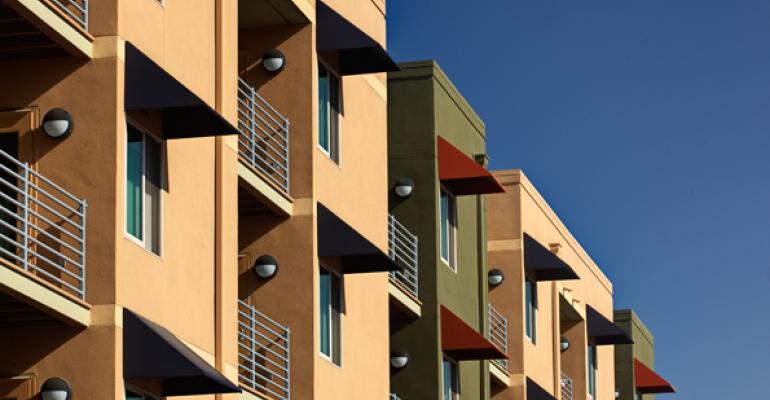Despite more than a decade of strong growth under its belt, the apartment sector occupancy rate continues to hit new highs.
"Terrific absorption has pushed occupancy upward to highs for this economic cycle," say Greg Willett, chief economist for RealPage Inc., a provider of property management software and services.
That might seem strange. The occupancy rate in the U.S. has already been high for a very long time. Economists and apartment experts have been expecting more apartment units to become vacant for years, as more developers open new buildings. But demand from renters remain strong, despite growing worries that the U.S. economy may be weakening.
“You would think that the market would be mature… We’ve had 10 years now of really strong multifamily demand,” says Jeanette Rice, Americas head of multifamily research with real estate services firm CBRE. “It’s still positive as it has been for many years; in some ways, it is more positive.”
Property managers fill apartments while they can
The average apartment occupancy rate in the U.S. rose to 96.2 percent in July, up 40 basis points from the year before, according to RealPage. That’s the highest the occupancy rate has been since 2000.
Average rents are also growing faster than inflation. “Annual rent growth for new resident leases is solid at 3.1 percent,” says Willett. But the high demand could be pushing rents higher more quickly, he notes. “Price growth isn’t pushing upward the same way that occupancy is.”
That’s because many property managers are worried that the good times in the U.S. economy can’t last forever.
“Apartment owners and operators generally are pushing for high occupancy right now, even if that means leaving a few dollars on the table in rent growth results,” says Willett. “They are concerned about a possible slowdown in economic growth and housing demand that could come at the same time apartment deliveries remain sky high.”
Demand grows despite economic worries
Economists have become increasingly worried about the possibility that the U.S. economy might slow down. The threats include of an escalating trade dispute with China and tremors in the bond markets.
But demand for apartments is still very strong. “Low unemployment lead to better wage increases in 2018 than any other part of the cycle,” says Andrew Rybczynski, senior consultant with research firm CoStar Portfolio Strategy.
In addition, larger demographic forces continue to boost demand for apartments. The aging of the population will lift the number of households age 65 and over by 11.1 million over the next decade, which in turn will increase the number of households consisting of either single persons or married couples without children by 8.4 million, according to analysis from Doug Ressler, director of business intelligence for data firm Yardi Matrix.
“There are more older renters than ever,” says Rybczynski. “Younger cohorts, on the other hand, are renting at considerably higher rates than historical precedents... Millennials have delayed marriage and children.”
However, even strong demand might not be enough to keep the apartment sector strong if the economy slows. Developers are still building a tremendous number of new units. “Construction trends are near peak levels of delivery and starts still high,” says Rice.
The number of new apartments opening is likely to stay very high at least through the next year or so. “Completions are not expected to really tail off until at least 2021,” says Rybczynski. “Census data shows that starts are slowing, and if that continues, then the seeds have been sown for a taper in two or three years.”

